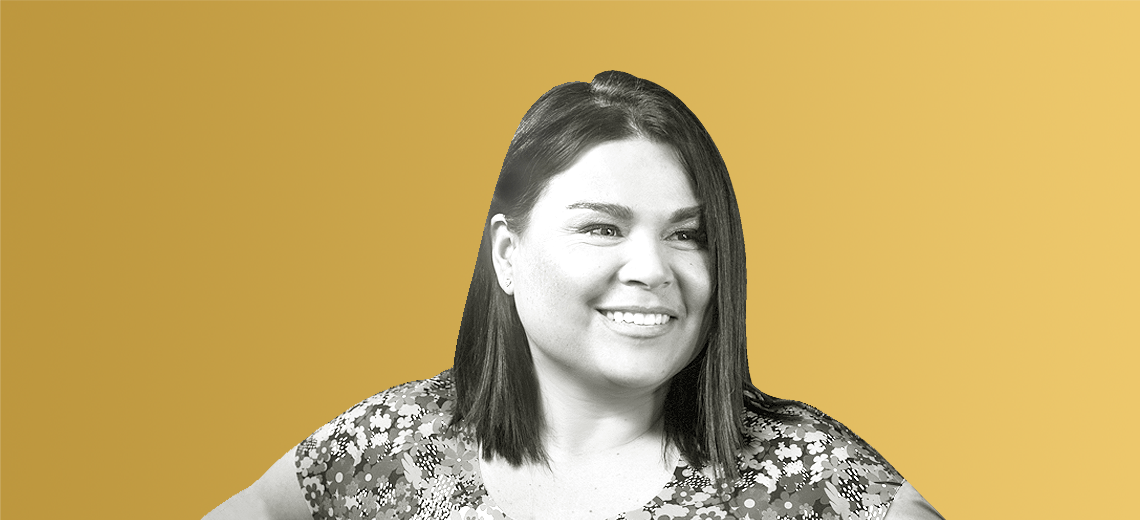This is an episode of the Glossy Beauty Podcast, which features candid conversations about how today’s trends are shaping the future of the beauty and wellness industries. More from the series →
Subscribe: Apple Podcasts • Spotify
Launching Cheekbone Beauty in 2016 was a bit of a serendipitous moment for founder Jenn Harper. It all started in Jan. 2015 when she dreamed about “Native little girls with their brown little skin and rosy cheeks, covered in lip gloss.” The dream, paired with Harper’s recent sobriety journey and deeper discovery about her lineage and Ojibwe culture, inspired her to create a beauty brand.
The journey to becoming a beauty founder was no easy feat for Harper. Until 2016, Harper’s professional career was rooted in the food industry, specifically seafood. Though she had no formal experience in beauty, her determination to launch a successful brand and celebrate her indigenous culture were her biggest motivators. Through thorough research and sourcing, Harper launched Cheekbone Beauty in Nov. 2016 as a DTC brand.
“Going back, of course, I’d love to do things differently,” Harper shared on the latest episode of The Glossy Beauty Podcast. “However, I learned so much from starting things the way [I did], by being super scrappy about how we were going to build and learning how to [launch a business in real time].”
In 2019, after Cheekbone Beauty’s launch, Harper went on “Dragon’s Den,” a fundraising show similar to “Shark Tank.” She did not accept an offer, but the exposure helped catapult Cheekbone Beauty’s brand awareness. In addition to her experience on “Dragon’s Den,” Harper connected with Raven Capital, the first Indigenous investment fund in the world. The company initially offered Harper $350,000 to transition her business from being a private white label to creating its own products and packaging. Thanks to the funding, in March 2020, Cheekbone Beauty launched with its first proprietary product, the Sustain Lipstick.
As Harper looks to the future, she said she’s excited about Cheekbone Beauty’s direction. In 2021, the brand launched in Sephora Canada. And most recently, Cheekbone Beauty secured a partnership with Thirteen Lune — it will be available to shop on the marketplace’s website and in 600 J.C. Penney locations. Apart from retail expansion, Cheekbone Beauty is also committed to innovation on the sustainability front through its packaging and clean ingredients.
Below are additional highlights from the conversation, which have been lightly edited for clarity.
Fundraising as a new beauty brand
“Staying in contact with [Sephora’s] vp of merchandising in Canada was a blessing in disguise. I got so so lucky with timing; our investors are Raven Capital, the first Indigenous investment fund in the world. They were starting up at the same time we were and reached out because they saw how much attention we were getting from the media in Canada. [Founders from Raven Capital and I] happened to be at the same event in Ottawa, and I was speaking on a panel, and one of the founders said, ‘Hey, we’re just starting out. … Let’s stay in touch, because I think we can help you with funding.’ … [At the same time,] I had applied and auditioned for ‘Dragon’s Den,’ and they came back with a term sheet. I planned that we would make the lipstick first, called Sustain Lipstick, and that happened. We launched that in March 2020. [Raven Capital offered me investment funding], and those early days working with Raven and them believing in us and giving us $350,000 as what they call a convertible debt — a loan basically, but hopefully it converts into equity — was something I never knew existed. [Raven Capital] has also grown with us. They’re now our full-on investment partner and have given us almost $2 million now.”
The impact of launching in Sephora
“We launched online with Sephora in Sept. 2021, and then in Nov. 2021, we went into five stores, including their flagship stores in Canada with one lipstick for a campaign called, ‘Write the Story.’ It was an incredibly beautiful experience to not only make a national commercial but to also work on this campaign that was 95% Indigenous-led. … To see this growth with [Sephora], it’s been incredible. … They know I’ve learned so much, and we’ve learned as a business and as a startup with them. They’ve been guiding us and helping us along the way. When I go back to the ‘why’ of starting this company, … I think about this experience.”




